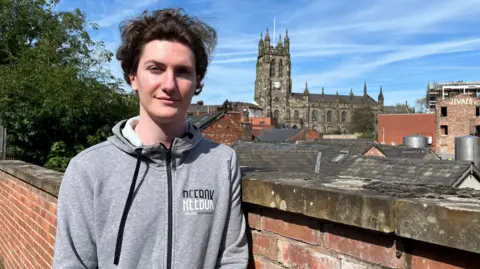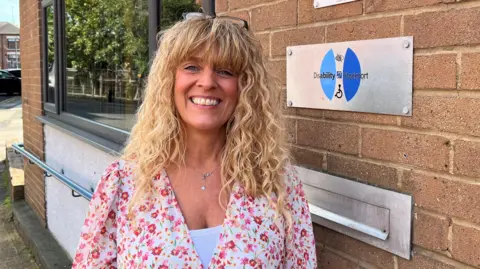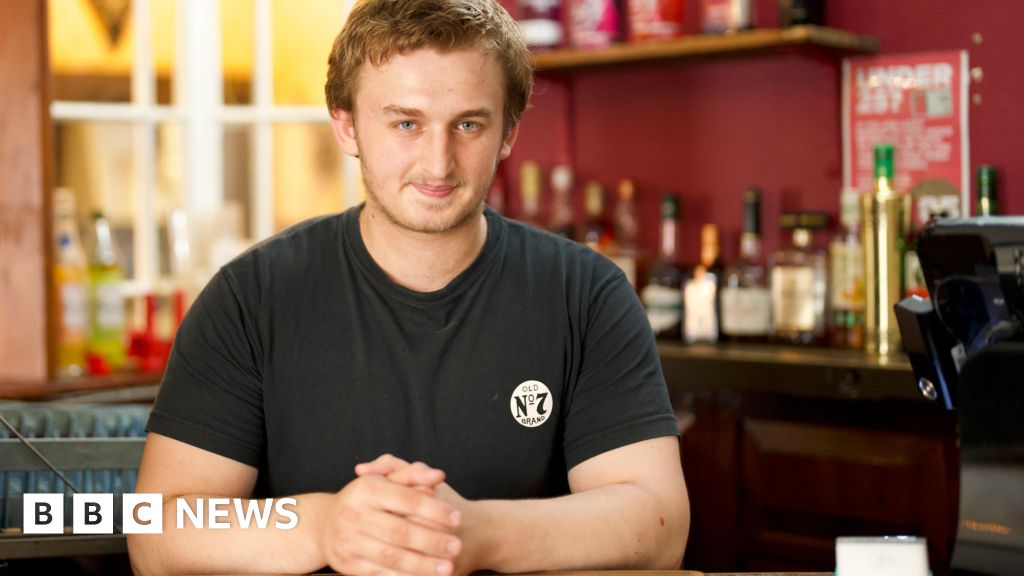
 BBC
BBC
Sam says emergency money, funded by the government's Household Support Fund, helped turn his life around
If Sam Fallon Nutt had not received emergency cash from a government fund last year, he has no doubt what would have happened to him.
"I'd be dead - 100%. I wouldn't be here. Simple as that," he told BBC R4's Money Box programme.
Last year, a local charity in Stockport helped Sam access money from the government's Household Support Fund (HSF).
He says that helped him access money to get medical treatment and stopped him having to sleep rough on the streets.
The fund has now been extended until April 2025 and will provide £500m for councils in England and the devolved nations to help those in financial hardship.
The move has been welcomed by charities and local authorities although they also have serious questions about whether or not such a short-term scheme, which can vary in how it is run from council to council, is the most efficient way of getting financial help to those who need it most.
Last year, Parliament's Work and Pensions Committee heard evidence how some of those most in need may be unwilling or unable to apply and that the fund's "discretionary nature may act as a barrier to access".
The Department for Work and Pensions says it is taking immediate action to prevent a cliff edge for some of society's most vulnerable people and that it's taking actions to fix the foundations of the country and economy.
'Life saving'
After falling into crisis with his health and housing, Sam turned to charity Disability Stockport for help. Partnered with the local council, it is able to distribute money from the fund directly to people like Sam.
"I've had two hip reconstructions and my knee done, so [money from the fund] helped me go to those appointments where I would've had to get a taxi, a bus, two trains and then another taxi on the other end which is almost impossible because [the hospital] is right in the sticks."
Sam describes this first bit of help as "life changing". The second, he described as "life saving" as the charity stepped in when he became homeless.
"I was living in a hostel due to becoming homeless which incurred charges of about £20 per week.
"I wasn't able to access benefits... and Disability Stockport covered those charges so I was able to avoid sleeping rough," he says.
"That was for at least a couple of months... so it was literally life saving."
During this time last year, when he says he had "nothing", the charity and fund gave him hope.


Sarah Crookdake helps run the charity Disability Stockport
Sarah Crookdake and the team at Disability Stockport have helped dozens of people like Sam.
"Everything that Sam has had, that's including the crisis support, the support to get to the appointments, paying the service charges, I bet that's come in easily under £1,000," she says.
"Just that bit of support... and with Sam's determination, has turned his life around 360 degrees in a year."
The Household Support Fund was introduced in 2021 to help people hit by the coronavirus pandemic and has already been extended several times.
Councils can use the money to help people afford their food, energy and water bills as well as other essential items.
The scheme is aimed at vulnerable people but individual councils can decide on their own eligibility criteria and how the money is spent.
People can access the funds in different ways, depending on how their local council is distributing the money.
For some of those in need they can be referred by partner agencies such as food banks, GPs or Citizens Advice.
Some councils offer pages on their websites where people can apply for help directly.
However, not all councils have been able to use their allocated funds in the past, according to Local Government Association (LGA) spokesperson on finance, Peter Marland.
"Obviously one of the issues of a hand-to-mouth scheme... it's very difficult for councils to take long-term decisions about running the schemes," he says.
"On the back of cuts many councils have had to make, it is difficult for councils to sometimes get funding out of the door."
He suggests that while many councils have used the funding, there needs to be a shift to "longer-term support" and funding for people in crisis.
For Sam, it has turned his life around.
He is now living in permanent accommodation and completing the last year of his degree.
"I just needed some help, I just needed to be put back on my feet," he says.
The Department for Work and Pensions said that the extension of the HSF would prevent "a cliff edge of support for the most vulnerable in our society.
"At the same time, we are taking action to fix the foundations of our country through our plans to grow the economy, make work pay, and Get Britain Working again," they added.



 Movie
Movie 3 months ago
65
3 months ago
65 






![Presidents Day Weekend Car Sales [2021 Edition] Presidents Day Weekend Car Sales [2021 Edition]](https://www.findthebestcarprice.com/wp-content/uploads/Presidents-Day-Weekend-car-sales.jpg)



 English (United States)
English (United States)